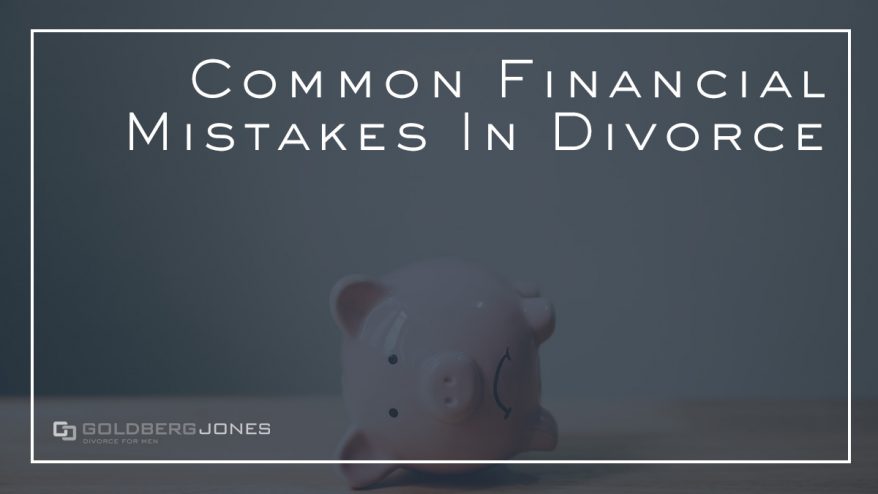Divorce has a massive impact on your life in every way. In a relatively short span, your living situation, relationship status, and parenting time all undergo titanic shifts. One of the most overlooked consequences is the monetary impact of dissolving your marriage. There are many common, yet easily avoidable financial mistakes people make in divorce.
Common Divorce Mistakes That Can Affect Your Finances
A significant part of the divorce process is the division of property, where the two sides split up the shared assets and debts acquired throughout the marriage.
Below are a few financial mistakes in divorce that can cost you dearly in divorce. You may want to take steps to avoid these pitfalls. With focus and attention, you should be able to sidestep these problems.
Agreeing To Anything To Rush Through The Process
Since long-term economic stability often hangs in the balance, it’s important not to rush into anything.  Divorce is an emotional time and some people want to get it over with ASAP. Far too often, this leads people to make hasty, rash decisions without taking the time to consider the consequences.
Divorce is an emotional time and some people want to get it over with ASAP. Far too often, this leads people to make hasty, rash decisions without taking the time to consider the consequences.
Just getting it done may seem great in the short run, but it often leads to substantial financial mistakes. In the rush to finalize your divorce, you often give up more than you have to.
While it may appear fine at the moment, people commonly come to regret reckless decisions. On the other side, if you don’t take the time to account for what is available and what you need moving forward, people frequently leave things on the table the court may otherwise award them.
Related Reading: How To File For Divorce In Oregon
Acting Out Of Spite Or Anger
Wanting to be finished with a divorce often leads to rash decision-making. So, too, does acting out of a sense of anger or bitterness. ![]() Hurt feelings are natural and often part of the process. They also cloud judgment and lead to choices that aren’t in your best financial interest.
Hurt feelings are natural and often part of the process. They also cloud judgment and lead to choices that aren’t in your best financial interest.
Some people try to use divorce as a means of punishment or retribution. While that may be cathartic at the moment, it may not be smart logistically speaking.
Engaging in an epic, scorched-earth divorce gets expensive. And with both sides drawing money from the same well, people often wind up costing themselves more money in the long run. This is one of the biggest financial mistakes we see people make.
Related Reading: How Is A Business Divided In A Divorce?
Not Knowing the Value Of An Item
Some pieces of the financial puzzle are easy to put a price tag on. Look at a shared bank account or loan debt. It’s plain to see just how much it’s worth.

These are also readily accessible assets. For other items, however, the picture isn’t quite so clear.
A car or a house, for example, presents complications. While these may have value on paper, you may not always be able to sell them for that figure.
These items may also be difficult to liquidate. Selling a house is also a lengthy process. If you must sell quickly, you’ll probably take in less money.
It also happens that parties overvalue items due to an emotional connection. We all form attachments to certain possessions, placing added worth on something that may not have much real-world basis.
In these situations, you risk spending a great deal of time arguing back and forth about objects of relatively minor value in the grand scheme. People often focus on these items and less on those with a greater financial impact.
Related Reading: How Is Property Divided In Oregon?
Trying To Hide Assets
As we said, a major part of the divorce process is the division of property.  This is where the court splits the shared assets and debts per Oregon’s equitable distribution model. But the court only distributes what they know about.
This is where the court splits the shared assets and debts per Oregon’s equitable distribution model. But the court only distributes what they know about.
Ideally, you have enough trust and honesty that you and your spouse will be upfront when it comes to disclosing resources. Also, the law requires both sides to disclose all their property.
This, however, doesn’t always happen.
Some people go to great lengths to hide things from their spouses. They attempt to conceal certain valuables or even transfer property or money to a third party.
In a high-asset divorce, it’s even more tempting to try this, but it’s best to avoid underhanded strategies. Unless you’re remarkably devious and clever, you will be found out.
Judges and opposing counsel have seen it all before, and you face significant consequences if you get caught. Your credibility takes a huge shot and these actions may place you at a disadvantage for the remainder of your case.
If you think your spouse may be hiding assets, there are ways to search for these clandestine holdings.
- Check recent tax returns for inconsistencies.
- Examine bank accounts for large expenditures you didn’t know about.
- Use brokerage statements to look at the purchase and sale of stocks and bonds.
These are just a few places to investigate, but you want to be as thorough as possible.
If you have questions about whether or not your spouse disclosed everything, you may want to enlist the help of an experienced professional to help dig. Missing the signs or letting things slide is a common financial mistake in divorce settlements.
Related Reading: How Is Debt Divided In Divorce?
Forgetting About Your Taxes
You have many details to consider during the division of property.
 With everything else to account for, taxes often go overlooked. The potential impact is huge and can have far-reaching consequences.
With everything else to account for, taxes often go overlooked. The potential impact is huge and can have far-reaching consequences.
The most obvious factor is that your filing status changes after divorce, but there are others
In general, divorce is a non-taxable transaction if handled correctly. It’s possible to disburse money from a 401(k), 403(b), or deferred compensation plan without incurring any negative tax effect.
With some retirement plans, such as a 401(k), the recipient spouse is often able to cash out the funds without paying penalties. If disbursed improperly, cashouts can be costly.
Other assets you receive also often carry additional tax burdens.
One example of this is when assets are subject to capital gains. This occurs when you sell something for more than you paid for it—that profit is often taxable.
Capital gains most commonly apply to real estate, stocks, and investments.
But the same regulations don’t apply uniformly to every asset. For instance, the federal government taxes the sale of a primary residence differently depending on the gain.
Before agreeing to any settlement in a divorce, high-asset or otherwise, it’s important to know the tax implications of everything on the table.
Related Reading: Millenials, Boomers, And Gen X-ers Oh My: Breaking Down Divorce Rates By Generation
Not Considering Credit
Another factor that often flies under the radar is how divorce impacts your credit rating.
After finalizing the split, your former spouse’s credit ceases to influence yours. You both apply for loans and credit cards as individuals from here on out. That part is straightforward.
However, if there are remaining shared debts, they can still influence your credit score, even after the fact.
Getting a divorce doesn’t alter pre-existing agreements you and your spouse entered into while married. If you secured a car loan, mortgage, or accrued significant credit card debt in both names, you remain on the hook for those payments.
The court may assign your ex to pay a joint debt like this. Ideally, that’s what will happen. But if it doesn’t go down that way, it will negatively impact you and your standing like any other late or missed payment.
The final agreement can include provisions like requiring your former spouse to refinance a loan and remove your name by a certain point. But we all know people don’t always do what they’re supposed to. It never hurts to keep an eye on your credit score and double-check.
Related Reading: 5 Ways Divorce Impacts Social Security
Hiring The Wrong Lawyer
Many people try to hire the toughest, meanest lawyer they can find. Having a strong advocate to fight for you is definitely important, but enlisting a rabid bulldog of an attorney doesn’t always mean you hired the right one.
When it comes to your financial future, an attorney with experience in similar cases is more important than someone who wants a legal fistfight. Consider what you have to protect, what you want from a settlement, and what you need in the future.
An appropriately aggressive attorney with an understanding of these elements will likely prove much more effective and practical than a legal brawler.
Divorce dramatically alters your finances. Take the time to consider the repercussions of your choices during the process. You want to start the next chapter of your life on the best economic footing possible.
The greater the pool of assets to divide, the more complicated and heated things become. Too often people make financial mistakes that start their new lives in a hole.
Related Reading: Should You Move Out? Not Yet, Here’s Why

Comments 1
how can i pay child support when i am now behind in rent, every month now i get eviction notice. I am behind in other bill. in order to get to work, i need my car, but i’m paying that too. plus food, etc, i a very limited, now that a draft i pulled, my cell i need that for communication, but each month that gets shut off, i tried to get other work, but criminal conviction is preventing me. basically, im’ stuck, if i move i will need to pass criminal record, and i wont, so im stuck at this rental which i was able to afford before. court charging me for my past child support cause now my ex has children. so they back dated that fee so i dont have $